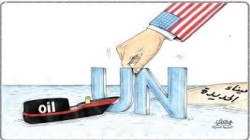UN, Red Sea Pirates Partners in fuel ship detention in Yemen
YemenExtra
Yemenis were warned of the starvation policy practiced by the Saudi-led aggressive coalition against the Yemeni people.
So, every time Yemeni oil company workers and employees have demands for the release of oil derivatives vessels detained by the US-led aggression coalition and the participation of the United Nations in this.
They stressed that the United Nations is a key partner in maritime piracy on fuel ships.
Despite the calls for distress and repeated requests for the release of the fuel ships, not a single liter of oil derivatives was allowed during 2021, YPC Executive Director Ammar al-Adhrue’e said.
He noted that 26 million Yemenis were threatened by piracy on fuel vessels and continued detention despite being granted UN permits.
“We have handed over all international reports, as well as the UN Convention on the Law of the Sea, to remind them of the article stipulates that all countries in the world should make every effort to stop and prevent piracy against any country in the world outside its territorial waters,” he said.
Meanwhile, the company’s spokesman, Essam al-Mutawakel, stated the Yemeni people also incurred fines for detaining fuel ships last year, which amounted to $ 91 million, equivalent to Y.R 54 billion.
He said the situation in Yemen has become catastrophic as a result of the continued detention of oil ships.
“We only hear from the United Nations or the international community condemnations, media statements, and a feeling of anxiety but the situation in Yemen has become disastrous today and does not bear feelings of anxiety or statements,” he added.
Al-Mutawakel called for urgent intervention to release the detained oil ships to prevent a humanitarian catastrophe as many services and vital sectors, especially hospitals, electricity, water, and freight transport trucks will be stopped.
The company spokesman held the aggression forces fully responsible for the humanitarian disaster in Yemen.
On the other hand, Speaker of Shura Council Mohammed al-Aidarous has sent letters to the chairman of the Association of Senates and Shura Councils and similar councils in Africa and the Arab world, the heads of the Senate and Shura Councils in the League, the Secretary-General of the United Nations and his envoy for Yemen, and the heads of the Parliament International, the European and African Parliaments.
The letters included the explanation of the continued detention of the oil ships by the US-Saudi aggression and the prevention of their allowing to unload their shipments at the port of Hodeida despite obtaining the United Nations’ permits in a flagrant violation of the economic and living rights of the Yemeni people.
The letters also addressed to the heads of the Senate, Shura and similar councils in Malaysia, Pakistan, Indonesia, Iran, Russia, China, Japan, India, Germany, France, Italy, Spain, the Netherlands, Belgium, Austria, Australia, Argentina and Brazil over detaining oil ships at sea and prevent unloading their cargoes at Hodeida port.
Al-Aidarous pointed out that the Yemeni Oil Company in the capital, Sana’a is currently working with only 1% of its oil services in various provinces as a result of not allowing one liter of fuel to enter into Hodeida port since the beginning of 2021.
He clarified that such a move will lead to a dire humanitarian catastrophe that has already begun with the closure of a number of hospitals, health and service centers, and the catastrophic repercussions on the agricultural, economic and environmental sectors.
The Shura speaker affirmed in the letters that the aggression’s insistence on preventing ships from unloading their shipments in the port of Hodeida is a crime no less terrible than the murder of Saudi journalist Jamal Khashoggi by the Saudi regime.
Al-Aidaroos condemned the international silence and the United Nations’ move away from its founding charters by not respecting the Stockholm Agreement, using the needs and suffering of citizens as a tool of pressure for political purposes and practicing collective punishment that targets millions of Yemenis.
Yemeni people held the USA and the rest of the aggression countries fully responsible, ethically and legally, for the humanitarian repercussions resulting from the continuation of the blockade.
They called on free people in the world to intensify solidarity activities that reject the continued siege of oil derivative ships and demand the immediate release of all ships held unconditionally and not to be pirated on them in the future.
Yemenis will continue their firm position to encounter the US-Saudi aggression and will adhere to their right to defend Yemen by all possible and legitimate means, stressing that the consequences of the aggression and the siege on Yemen are dangerous for the coalition countries as well.
by: Mona Zaid

